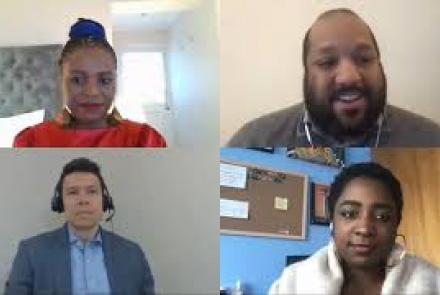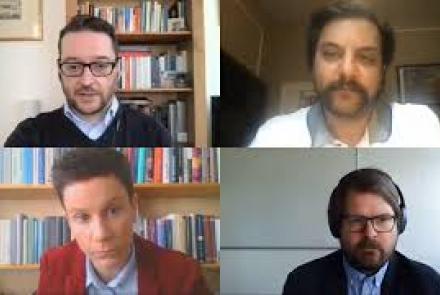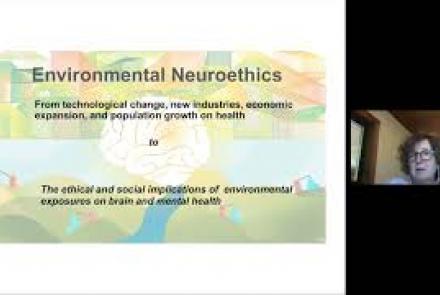Course:
Maximize Your Research With Cloud Workspaces is a talk aimed at researchers who are looking for innovative ways to set up and execute their life science data analyses in a collaborative, extensible, open-source cloud environment. This panel discussion is brought to you by MetaCell and scientists from leading universities who share their experiences of advanced analysis and collaborative learning through the Cloud.
Difficulty level: Beginner
Duration: 55:43
This final lesson of the course consists of the panel discussion for Streamlining Cross-Platform Data Integration session during the first day of INCF's Neuroinformatics Assembly 2023.
Difficulty level: Beginner
Duration: 50:16
Speaker: :
This lesson consists of a panel discussion, wrapping up the INCF Neuroinformatics Assembly 2023 workshop Research Workflows for Collaborative Neuroscience.
Difficulty level: Beginner
Duration: 25:33
Speaker: :
Course:
Panel discussion by leading scientists, engineers and philosophers discuss what brain-computer interfaces are and the unique scientific and ethical challenges they pose. hosted by Lynne Malcolm from ABC Radio National's All in the Mind program and features:
- Dr Hannah Maslen, Deputy Director, Oxford Uehiro Centre for Practical Ethics, University of Oxford
- Prof. Eric Racine, Director, Pragmatic Health Ethics Research Unity, Montreal Institute of Clinical Research
- Prof Jeffrey Rosenfeld, Director, Monash Institute of Medical Engineering, Monash University
- Dr Isabell Kiral-Kornek, AI and Life Sciences Researcher, IBM Research
- A/Prof Adrian Carter, Neuroethics Program Coordinator, ARC Centre of Excellence for Integrative Brain Function
Difficulty level: Intermediate
Duration: 1:14:34
Course:
Panel of experts discuss the virtues and risks of our digital health data being captured and used by others in the age of Facebook, metadata retention laws, Cambridge Analytica and a rapidly evolving neuroscience. The discussion was moderated by Jon Faine, ABC Radio presenter. The panelists were:
- Mr Sven Bluemmel, Victorian Information Commissioner
- Prof Judy Illes, Neuroethics Canada, University of British Columbia, Order of Canada
- Prof Mark Andrejevic, Professor of Media Studies, Monash University
- Ms Vrinda Edan, Chief Operating Officer, Victorian Mental Illness Awareness Council
Difficulty level: Intermediate
Duration: 1:10:30
To explore the challenges and the ethical issues raised by advances in do-it-yourself (DIY) neurotechnology, the Emerging Issues Task Force of the International Neuroethics Society organized a virtual panel discussion. The panel discussed neurotechnologies such as transcranial direct current stimulation (tDCS) and electroencephalogram (EEG) headsets and their ability to change the way we understand and alter our brains. Particular attention will be given to the use of neurotechnology by everyday people and the implications this has for regulatory oversight and citizen neuroscience.
Difficulty level: Beginner
Duration: 1:00:59
Panelists shared their unique perspectives on what role neurotechnology and technologists could play in exacerbating or thwarting scientific oppression. Technologies that record and stimulate the brain are set to transform medical treatment, interpersonal life, and even what it means to be human; but these neurotechnologies may, if we’re not careful, continue legacies of harm against people of color, women, LGBTQIA-identifying persons, and disabled people. How can we keep neurotechnology from becoming oppressive? What would 'anti-oppressive' brain technology look like?
Difficulty level: Beginner
Duration: 1:33:16
The INS Emerging Issues Task Force organized a virtual panel discussion on ‘Culturally-Aware Global Neuroethics.’ Panelists explored the issue of cultivating a culturally-aware global neuroethics, and discussed a range of illuminating examples of global priorities in neuroethics.
Difficulty level: Beginner
Duration: 1:03:27
In this interdisciplinary panel discussion, panelists explored and discussed the technical, ethical, and legal dimensions of brain data governance and neurorights.
Difficulty level: Beginner
Duration: 1:00:14
The INS Emerging Issues Task Force held a virtual panel discussion on the evolving role and increased adoption of digital applications to deliver mental health care. It was held as a session at the annual conference of the Italian Society for Neuroethics.
Difficulty level: Beginner
Duration: 58:30
To encapsulate the emerging concerns at the convergence between brain and environmental health whilst aligning it with ethical considerations, the Emerging Issues Task Force of the International Neuroethics Society organized a virtual panel discussion. The panel focused on four areas of analysis. Specific attention was given to how these four tiers come together to provide directions for future ethically-minded and behaviorally-driven environmental health research.
Difficulty level: Beginner
Duration: 1:03:34
This panel discussion covers how energy based models are used and is a part of the Deep Learning Course at NYU's Center for Data Science.
Difficulty level: Intermediate
Duration: 10:42
Speaker: : Yann LeCun and Alfredo Canziani
The epilepsy SP actively promotes and supports epilepsy-related issues as well as educational and scientific activities within the framework of EAN. Our partners ILAE/ILAE Europe, EpiCare, EPNS and AOAN are actively involved. One of the major tasks is promoting submissions of session proposals for EAN congress balancing new scientific approaches and educational need for teaching courses. Outside of congress activities, contributions to e-learning facilities on the EAN website such as registrars reading list, scales and scores and breaking news are regularly presented or updated. Particular since the COVID pandemic, publications on COVID and any issues of epilepsy or seizures are regularly screened and summarized in neurology updates. In partnership with the ILAE/ILAE Europe, several guidelines are under preparation.
Difficulty level: Intermediate
Duration: 14:56
Speaker: : Tim J. von Oertzen
Course:
This talk focuses on the EAN Scientific Panel of Stroke, in particular on the aims and roles of the panel.
Difficulty level: Intermediate
Duration: 18:19
Speaker: : Anna Bersano
The number of patients with dementia is estimated to increase given the aging population. This will lead to a number of challenges in the future in terms of diagnosis and care for patients with dementia. To meet these needs such as early diagnsosis and development of prognostic biomarkers, large datasets, such as the federated datasets on dementia. The EAN Dementia and cognitive disorders scientific panel can play an important role as coordinator and connecting panel members who wish to participate in e.g. consortia.
Difficulty level: Intermediate
Duration: 15:39
Speaker: : Kristian Steen Frederiksen
In February 2020, the Canadian government published its "Roadmap for Open Science" to provide overarching principles and recommendations to guide Open Science activities in federally funded scientific research. It outlines broad guidelines for making science in Canada open to all while respecting privacy, security, ethical considerations, and appropriate intellectual property protection.
Difficulty level: Beginner
Duration:
Speaker: :
Course:
An introduction to data management, manipulation, visualization, and analysis for neuroscience. Students will learn scientific programming in Python, and use this to work with example data from areas such as cognitive-behavioral research, single-cell recording, EEG, and structural and functional MRI. Basic signal processing techniques including filtering are covered. The course includes a Jupyter Notebook and video tutorials.
Difficulty level: Beginner
Duration: 1:09:16
Speaker: : Aaron J. Newman
Course:
This book was written with the goal of introducing researchers and students in a variety of research fields to the intersection of data science and neuroimaging. This book reflects our own experience of doing research at the intersection of data science and neuroimaging and it is based on our experience working with students and collaborators who come from a variety of backgrounds and have a variety of reasons for wanting to use data science approaches in their work. The tools and ideas that we chose to write about are all tools and ideas that we have used in some way in our own research. Many of them are tools that we use on a daily basis in our work. This was important to us for a few reasons: the first is that we want to teach people things that we ourselves find useful. Second, it allowed us to write the book with a focus on solving specific analysis tasks. For example, in many of the chapters you will see that we walk you through ideas while implementing them in code, and with data. We believe that this is a good way to learn about data analysis, because it provides a connecting thread from scientific questions through the data and its representation to implementing specific answers to these questions. Finally, we find these ideas compelling and fruitful. That’s why we were drawn to them in the first place. We hope that our enthusiasm about the ideas and tools described in this book will be infectious enough to convince the readers of their value.
Difficulty level: Intermediate
Duration:
Speaker: :
















